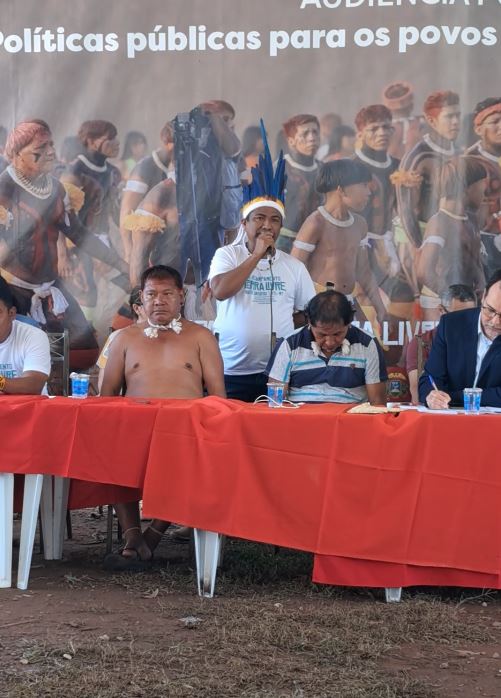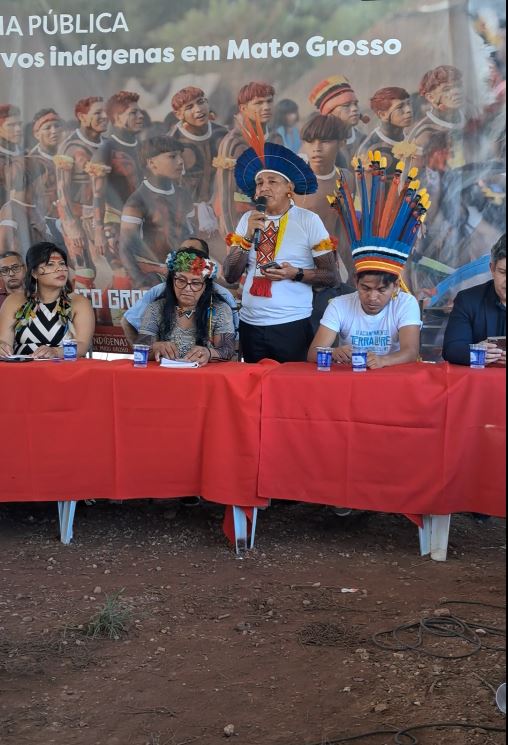ATL-MT: indigenous Peoples, expose violations, and to assert the rights
The event brings together leaders from all the regions in the discussion of the guidelines and policies that will be implemented in the state .

It was held at the Lakeland square, with Ulisses Guimarães, June 3, and 5 are in the second Camp-Land of the Free (ATL) in Mato Grosso state, edition of the state of that which is the greatest mobilization of the indigenous peoples of Brazil. After table discussions during the week, they met on the last day of a hearing in the public square, where the alleged violations, and claimed their rights to the territory, health care, education, and consulting projects that you can impactá them.
“The ATL, it’s a political movement, a movement of resistance,” said the president of the association of the indigenous Peoples and Indigenous Organizations from the state of Mato Grosso (Fepoimt), Also Xunakalo. She said that it was proposed to build a dialogue with all of the powers in relation to the needs and the solutions of them are presented. For this activity, Kokonan Metuktire, she was the daughter of the Cacique (chief) Raoni, has called for the protection of indigenous peoples ‘ lands: “We, the indigenous peoples, who are gathered here at this moment, we have to show for the effort. We don’t want the non-native and destroy the forest, and all our rivers”.
Soilo Urupe Chue Chue, the people of the Chiquitano, region of the Valley of the Guapóré the Fepoimt, claimed responsibility for the delimitation and demarcation of the lands of the Portal, the Enchanted, and the Town’s New Barbecho, and the rest of the state. “In the name of those two, you ask for all the territories, and the Chiquitano and in Nambikwara it is still in the process of demarcation, and extending to all of the lands of indigenous peoples that are still missing to be marked in the brazilian state of Mato Grosso. In his speech, Soilo he also pointed out the complementarity of the implementation of the policies of the government among the executive branches of local, state, and national levels, drawing attention to the situations and degrading treatment and punishment that are related to education and health care for indigenous peoples in canada.

Priest continued with the Xavante, the Coordination of the Indigenous Organizations of the Brazilian Amazon (Coiab), he wondered why health care is so poor and resulting in the deaths of the Xavante. He told me that on that day in the ATL, the son of an old friend, a child, I had just gone to the death in hospital of the state. “It is not because of a lack of resources, that we are dying. It is not for a lack of a feature in our Bhus and the pole to the base as soon as the patient is being fitted. There is a lot of demoralization, and a lot of breaking of our indigenous people in the brazilian state of Mato Grosso.
Gilmar Koloizomae the people of the Paresi, has spoken out about the situation of the increase in suicide among the indigenous people of the state, which has been grieving and caring for the community. “You’ve got to look at this in quite a bit of attention: the authorities and bodies responsible for the leadership”.
The education of the indians was another issue that had quite a bit of attention from the leaders in the ATL-MT. Helber the Indians, as the representative of the region of the Middle Araguaia river, has questioned on the difficulty of implementation, which is standardized in such policies. “The indigenous people have their own specific needs. This is for the competent authorities to also understand each other very well, it’s in the law, guaranteed,” he said, explaining that the concerns about the curriculum of the school of indigenous people. “And I say unto you, it is because the people Apyãwa [Tapirapé] she works with children, alfabetizando first, in the language of our own. Why are we working this way? To ensure the continuity of our language, our culture, for our organization,” he added.

The other issue raised by the present have been in the works for the infrastructure, without the consent of the indigenous peoples. Rosinês Kamunu, the people of the Manoki, according to the law of the consultation is free, prior and informed consent to projects that affect indigenous peoples. “Today, we are being affected by the gold rush, and the mining industry, so we ask that you be prompted before the release of these licenses, especially in our rivers, which are located in the valley of Juruena rivers. Our strength is very large, and it is for this reason that we are in the capital, even for the government of the state to listen to us”.
“Here, the government is discriminatory, hateful. And the members of the political and anti-indigenous, are you doing these projects don’t have to answer to the indigenous peoples of the project, alternatives to the survival and they do not end up with nature,” said Agnello the Xavante.
Heading to Brasilia
The month of April, as the indigenous people from the Mato Grosso is located on the population of the whole country, in the Campground, Land of the Free, which is celebrating 20 years of age. “Our framework is the common ancestor. We have always been here,” is the subject of the action that will take place in Brasilia in the days between the 22nd and the 26th in the Assembly of the Cultural Funarte.
